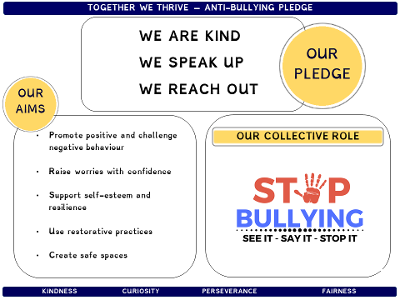Anti Bullying
Linlithgow Academy is committed to providing a safe, supportive environment that has a respectful, equitable and inclusive culture for all members of our school community. It is important to ensure that the ethos of anti-bullying is embedded in day-to-day practices that are in step with Respect for All. The message that bullying is never acceptable is always prevalent and continuously and consistently reinforced. (Respect for All, 2017)

Following analysis of pupil/parent/staff survey results our Anti-bullying Policy and associated actions are now in final format. All relevant information including school PowerPoint presentation on survey findings, our updated anti-bullying policy and associated protocols can all be accessed on this page. Following some further consultation we have now made some updates to our policy in October 2024. These updates are reflected in information below. |
Linlithgow Academy Anti Bullying Policy (updated Dec 2025) (PDF, 1 MB)(opens new window) supports the West Lothian Anti-Bullying Policy incorporated within the documents (), (Attendance, Behaviour and Bullying (opens new window)) and Respect for All: national approach to anti-bullying (opens new window) (Scottish Government 2017).
Our policy (which can be downloaded below) sets out the following information in more detail:
| What is bullying |
|---|
Bullying is the repetitive, intentional hurting of one person or group by another person or group, where the relationship involves an imbalance of power. It can happen face to face or online. (Anti-Bullying Alliance)
(Respect Me 2015) |
| Impact of bullying behaviour |
|---|
Bullying can affect people in different ways. Our response should focus on identifying how someone feels and helping them to cope with and respond to those feelings. Young people may act out of character when they are being bullied and changes in behaviour can be signals that something is wrong. We need to focus on what has happened and the impact it had. |
Forms of Bullying |
|---|
Bullying behaviour can harm people physically or emotionally and, although the actual behaviour might not be repeated, the threat that it might can be sustained over time, typically by actions: looks, messages, confrontations, physical interventions, or the fear of these. |
Prejudice-based bullying |
|---|
| Bullying behaviour may be a result of prejudice that relates to perceived or actual differences. This can lead to prejudice and discriminatory language or behaviour, including racism, sexism, homophobia, biphobia or transphobia. 'Prejudice-based bullying is when bullying behaviour is motivated by prejudice based on an individual's actual or perceived identity; it can be based on characteristics unique to a child or young person's identity or circumstance.' Respect for All 2017 |
| Advice for pupils - I am being bullied - What should I do? |
It doesn't matter what colour hair you have; what trainers you are wearing; how you speak; how you walk; how you talk - it is not your fault if you get bullied. We are all different in some way and that's what makes us amazing. No matter who you are, bullying makes you feel rubbish and it is okay to be upset about it. The important thing is that you tell someone about it. If you feel you can, talk to a teacher you trust or a family member. If you don't want to do that you can always call Childline 0800 11 11 or visit www.childline.org.uk Talk to someone in school. In the first instance, this would be your Pupil Support Teacher/House Head. This will be recorded by the school, investigated and reviewed in line with our Anti-bullying action plan, detailed on page 10. If you don't want to tell someone in the first instance, complete an online anti-bullying self-referral form: http://www.linlithgowacademy.org/article/73526/Anti-Bullying-Self-Referral-Form Write down what happened, when it happened, and who was involved. If the bullying is online, keep the evidence - save or copy any photos, videos, texts, e-mails or posts. It can be tempting if you are being bullied to take revenge - for example to send a horrible message back to someone; to try and embarrass and hurt the other person, or to fight back. This is not a good idea - you might end up getting in trouble or get yourself even more hurt. Think about other ways you can respond to bullying. For example, practice saying 'I don't like it when you say that/do that - Stop.' Think about other people who can help you if you are being bullied - this could be other classmates, or a teacher. Only spend time with people who make you feel good about yourself. If someone constantly puts you down they are not a real friend/ boyfriend/ girlfriend and not worth your time. Be kind to yourself, and do things that make you feel good, relax and make new friends. You might make music; write lyrics; draw cartoons; dance; act or join a sports club. This is your life so make sure it's the best life possible - don't let anyone bring you down. Remember to respect other people! Just because someone is different to you and your friends - that doesn't mean you are better than them or have a right to make them feel bad. If you mess up, say sorry. You don't have to be friends with everyone - but you should always make it clear that you don't like it when people bully others, and stick up for people who are having a hard time. |
Advice for parents/carers - My Child is being bullied - What can I do? |
|---|
No single sign will indicate for certain that your child is being bullied, but watch out for:
belongings getting 'lost' or damaged physical injuries, such as unexplained bruises being afraid to go to school, being mysteriously 'ill' each morning, or skipping school not doing as well at school asking for, or stealing, money (to give to whoever's bullying them) being nervous, losing confidence, or becoming distressed and withdrawn problems with eating or sleeping bullying others You might experience a huge range of emotions if you discover your child is being bullied. Here is some advice to support: Talk to them about bullying and cyberbullying. Explain what bullying is, ask if anything like that has happened to them. Keep calm and listen carefully to what they say. Reassure about the next steps - they may feel scared, embarrassed or ashamed. Continue to check in and offer to listen. Let them know who to ask for help. This could be a trusted adult, a teacher or a family member. Speak to the school. In the first instance, this would be the Pupil Support Teacher/House Head. This will be recorded by the school, investigated and reviewed in line with our Anti-bullying action plan, detailed on page 10. You could encourage your child to complete an online anti-bullying self-referral form: http://www.linlithgowacademy.org/article/73526/Anti-Bullying-Self-Referral-Form Help them relax and take time out. Bullying can reduce confidence. Provide opportunities to make them feel good and build confidence. Reassure at all points. Report bullying on social media and online gaming. Don't stop them from using their phone or social media - this could feel like a punishment and the child has not done anything wrong. Support to block and report. https://www.thinkuknow.co.uk/parents/Concerned-about-your-child/ Report bullying videos shared online. Get in contact with the site the video is shared on as soon as possible. If a report is made and depending on the sites terms and conditions, they may be able to remove this. Report hate crime to the Police. |
How will we respond to bullying behaviour? |
|---|
As a school community we are committed to ensure a welcoming and inclusive ethos where we share an understanding of Anti-bullying behaviour. We have consulted with pupils to agree the following anti-bullying pledge (Appendix 1), centred firmly around our positive ethos of respect, ready, responsible and safe: We acknowledge that within our school, pupils and staff have a collective responsibility for challenging bullying behaviour. Through this we aim to: Acknowledge that bullying behaviour happens in our community. Give assurance to pupils, parents and carers that reports of bullying incidents will be: Taken seriously Investigated promptly Fully dealt with appropriately and feedback given to all involved as required Support will be offered, where appropriate, for all involved Work together to develop an Anti-Bullying strategy that is consistent with West Lothian Council's vision and national best practice and is accepted by the whole community Advise how pupils who have been involved in bullying behaviour will be supported Review our strategy regularly
The diagram (Appendix 2) is part of our anti-bullying pledge and identifies the roles, responsibilities and procedures where bullying behaviour is observed or reported, with an Alleged Bullying Incident Form (Appendices 3 & 4) completed. From transition in S1, pupils, parents/carers are made aware of our house structure and the roles and responsibilities of the House Head, Pupil Support Teacher, Pupil Support Manager and Well-being Office staff. This ensures our school community knows who to speak to if they are concerned about bullying behaviour. It is important that pupils, parents/carers and staff are confident in reporting any bullying concerns that they may have. Equally, we encourage a "Speak up and Report" approach where we challenge any bullying behaviour observed or are aware of, and report this.
|
Reporting, Recording, Monitoring and Quality Assurance |
|---|
Reporting Bullying allegations are reported by staff on a CARE (Concerns About Relationships and Education) Microsoft form. Staff are asked to detail the incident based on a range of details: Details of person/s experiencing Details of person/s demonstrating Nature of incident Perceived reasons for incident (includes nine protected characteristics) Further details about the incident (including any actions taken)
Investigating Following the submission of a CARE form, the House Team/s (Pastoral Support Worker//Head of House) of the pupils involved (experiencing and demonstrating), in addition to the Pupil Support Manager (with an overview of all incidents for consistency) are informed via email and investigations commence. Parents/carers of pupils involved will be informed of the alleged incident, investigations, actions taken and next steps, for their child only. This is further discussed at a weekly House Team Meeting attended by the Pupil Support Manager, Head of House and Pastoral Support Worker.
Monitoring/Review Regardless of an alleged incident being founded or unfounded, it will be monitored for the following two weeks and reviewed thereafter, again with parents/carers informed of the outcome. Throughout the process, the alleged incident, investigation, actions and review will be recorded within the CARE log and as part of the Seemis Equalities and Bullying log.
Quality Assurance/Next Steps Throughout the session, bullying behaviour is monitored through CAREforms/Seemis reports analysis and this then informs/supports further action required such as inputs in PSE lessons and specific focus at assemblies. Our Anti-Bullying Pupil Parliament Committee and Mentors in Violence Prevention also use this data as part of their annual Improvement Planning. |
Further help and advice for parents and students can be found through the following organisations:
http://www.anti-bullyingalliance.org.uk/
https://www.nationalbullyinghelpline.co.uk/
https://www.nspcc.org.uk/what-is-child-abuse/types-of-abuse/bullying-and-cyberbullying/
https://www.youngminds.org.uk/young-person/coping-with-life/bullying/
https://www.children1st.org.uk/help-for-families/parentline-scotland/guidance-advice/bullying/





